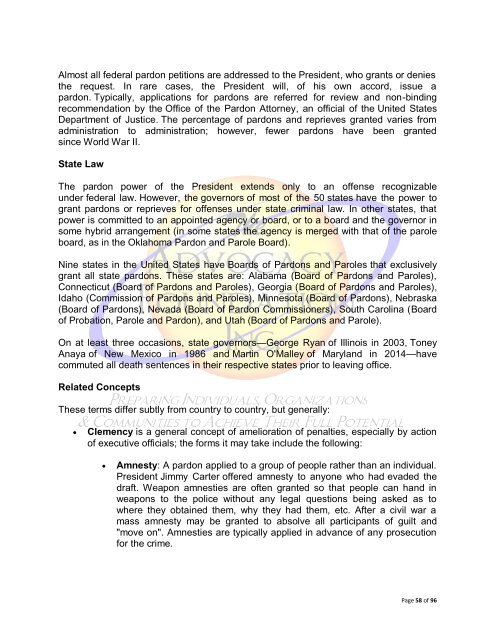Law for The Poor
Law for The Poor
Law for The Poor
Create successful ePaper yourself
Turn your PDF publications into a flip-book with our unique Google optimized e-Paper software.
Almost all federal pardon petitions are addressed to the President, who grants or denies<br />
the request. In rare cases, the President will, of his own accord, issue a<br />
pardon. Typically, applications <strong>for</strong> pardons are referred <strong>for</strong> review and non-binding<br />
recommendation by the Office of the Pardon Attorney, an official of the United States<br />
Department of Justice. <strong>The</strong> percentage of pardons and reprieves granted varies from<br />
administration to administration; however, fewer pardons have been granted<br />
since World War II.<br />
State <strong>Law</strong><br />
<strong>The</strong> pardon power of the President extends only to an offense recognizable<br />
under federal law. However, the governors of most of the 50 states have the power to<br />
grant pardons or reprieves <strong>for</strong> offenses under state criminal law. In other states, that<br />
power is committed to an appointed agency or board, or to a board and the governor in<br />
some hybrid arrangement (in some states the agency is merged with that of the parole<br />
board, as in the Oklahoma Pardon and Parole Board).<br />
Nine states in the United States have Boards of Pardons and Paroles that exclusively<br />
grant all state pardons. <strong>The</strong>se states are: Alabama (Board of Pardons and Paroles),<br />
Connecticut (Board of Pardons and Paroles), Georgia (Board of Pardons and Paroles),<br />
Idaho (Commission of Pardons and Paroles), Minnesota (Board of Pardons), Nebraska<br />
(Board of Pardons), Nevada (Board of Pardon Commissioners), South Carolina (Board<br />
of Probation, Parole and Pardon), and Utah (Board of Pardons and Parole).<br />
On at least three occasions, state governors—George Ryan of Illinois in 2003, Toney<br />
Anaya of New Mexico in 1986 and Martin O'Malley of Maryland in 2014—have<br />
commuted all death sentences in their respective states prior to leaving office.<br />
Related Concepts<br />
<strong>The</strong>se terms differ subtly from country to country, but generally:<br />
<br />
Clemency is a general concept of amelioration of penalties, especially by action<br />
of executive officials; the <strong>for</strong>ms it may take include the following:<br />
<br />
Amnesty: A pardon applied to a group of people rather than an individual.<br />
President Jimmy Carter offered amnesty to anyone who had evaded the<br />
draft. Weapon amnesties are often granted so that people can hand in<br />
weapons to the police without any legal questions being asked as to<br />
where they obtained them, why they had them, etc. After a civil war a<br />
mass amnesty may be granted to absolve all participants of guilt and<br />
"move on". Amnesties are typically applied in advance of any prosecution<br />
<strong>for</strong> the crime.<br />
Page 58 of 96

















